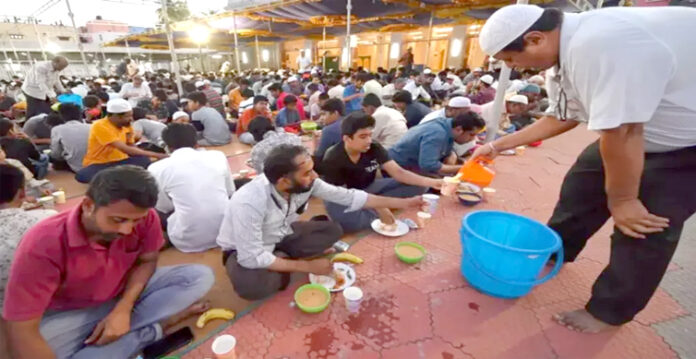In a remarkable display of communal harmony, the Sufidar Temple in Mylapore has continued its 40-year-old tradition of serving Iftar meals to fasting Muslims during Ramadan. This initiative, founded by Dada Ratanchand—a Hindu refugee from Sindh—has become a symbol of unity, bringing together volunteers from both Hindu and Muslim communities to prepare and distribute meals daily.
Every evening, over 1,200 individuals receive nutritious Iftar meals at the historic Wallajah Masjid. Volunteers begin cooking at 7:30 AM, preparing dishes such as fried rice, biryani, vegetable pickles, saffron-infused milk, and fresh fruits. By sunset, these meals are transported in cargo vans and distributed by 60-70 volunteers, who don traditional Muslim skull caps as a sign of respect for Islamic customs.
Prince Nawab Abdul Ali of Arcot has lauded the initiative, stating, “In a secular country like India, everyone should respect each other’s religions… We must show the world that we are one.” His endorsement highlights the broader significance of this effort in fostering interfaith goodwill.
Also Read: Complaint Filed Against Thalapathy Vijay Over Iftar Event Controversy
The Sufidar Temple was established by Dada Ratanchand, who migrated from Sindh to Chennai during the Partition of 1947. Deeply inspired by the teachings of Shehanshah Baba Nebhraj Sahib, a revered Sufi saint, Ratanchand built the temple as a place of spiritual inclusivity. Its walls reflect this ethos, adorned with images of Sufi saints, Hindu sages, Jesus Christ, Mother Mary, Guru Nanak, Sikh Gurus, Sai Baba, and figures from the Radhasoami and Chidakashi sects.
The tradition of serving Iftar meals began when members of the Arcot royal family visited the temple and entrusted Ratanchand with the responsibility of organizing the meals. Since then, this practice has been carried out uninterrupted, growing in scale and impact.
After Ratanchand’s passing, his vision was carried forward by dedicated volunteers like Ramdev, who left his automobile business to fully commit to this cause. “I couldn’t dedicate much time earlier due to my shop. Now I devote myself entirely to this noble cause,” he shared. Volunteers from Maharashtra, Rajasthan, and various parts of Tamil Nadu join hands with local Chennai residents to sustain this tradition.
Ramdev meticulously oversees food preparation, hygiene, and logistics, ensuring every meal is delivered on time. “All gods are one,” he often reminds his team, reinforcing the spirit of inclusivity and mutual respect.
For beneficiaries like Jamila, who works near Wallajah Masjid, this initiative provides a vital source of sustenance and community support. “Since my house is far away, I break my fast here after work before heading home,” she shared.
Beyond the meals, the Sufidar Temple’s initiative nurtures a deeper understanding between communities. Volunteers bond while cooking, sharing stories, and learning about each other’s traditions. “Cooking together has made us closer; we share laughter while preparing meals,” said Priya, a volunteer from Chennai. Another volunteer, Ahmed, echoed this sentiment: “This is more than just food; it’s about sharing love and respect.”
At a time when divisions often dominate headlines, the story of the Sufidar Temple serves as a powerful reminder that acts of kindness can transcend religious differences and bring people together. This initiative not only nourishes bodies but also nurtures hearts, spreading a message of coexistence and unity.
As this noble tradition continues, it invites reflection on how similar efforts can be fostered in other communities. How can we contribute to creating spaces of unity and compassion in our own localities? Initiatives like the Sufidar Temple’s Iftar meals demonstrate that true harmony begins with shared humanity and a willingness to serve others.
Readers, what are your thoughts on this remarkable tradition? Share your reflections and ideas on promoting interfaith harmony in the comments below!
(This story is sourced from a third-party syndicated feed. Raavi Media takes no responsibility or liability of any nature. Raavi Media management/ythisnews.com can alter or delete the content without notice for any reason.)


